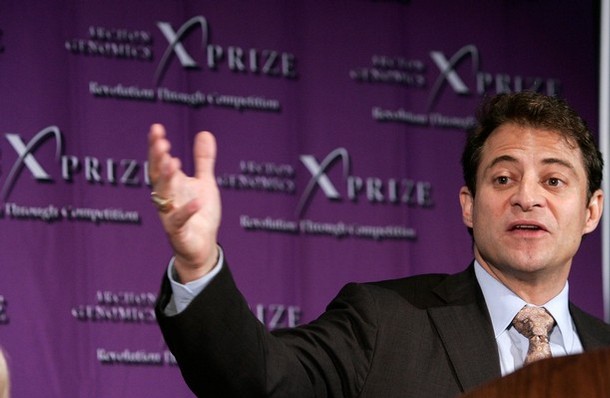 |
|
|
Greeks in Space! |
|
PETER DIAMANDIS, co-founder of the Space Adventure tourism company, last month made clear his intention to send a Greek national to space and kick-start a Greek space programme. "I think that if anyone can succeed in this, we can," said Diamandis, also founder of the X Prize Foundation for technological innovation. "We have flights available for Greeks who are passionate about space and can afford it. " SpaceShipOne, the winner of the Ansari X Prize offered by the X Prize Foundation 12 years ago, has made Diamandis' aspiration a little more plausible. The prize was part of a regulated competition to |
 Peter Diamandis says that better awareness of innovative technology will see to higher investments |
|
launch a reusable spacecraft twice within 14 days. Twenty-six teams competed for the 6.5m euro prize, but in 2004 it was awarded to SpaceShipOne. "The first generation of space tourists, many of whom are with us today, will be paving the way as they marvel at the beauty of our planet and experience the freedom of weightlessness and the blackness of space," Branson said. NASA which celebrated its 50th birthday on the day of WhiteKnightTwo's debut, is in an increasingly insecure position - federal funding has decreased 30 percent in real terms for the US Space Programme since 2000. "So far we have taken 5,000 peaple to weightlessness and five into orbit," Diamandis told this newspaper. A GreekAmerican, Diamandis was inspired to reinvent the idea of science competitions after he read about the Spirit of St Louis, the design of which won the $25,000 Orteig Prize in 1927 for being the first aircraft to fly non-stop from New Yark to Paris. "But it's not about money; the prize is just the target," Diamandis said. "Compare it to the America's Cup where hundreds of millions are invested for a zero-sum prize. We are simply tapping into the human spirit of competitian to drive breakthroughs in innovations." This venture is not just a hobby for Diamandis; he is passionate about getting private individuals and companies involved in space exploration and stimulating the market to continue the work the Cold War space race initiated. He reacted strongly against the suggestion that, at 130,000 euros per person for a flight on WhiteKnightTwo, this sort of technology only benefits the wealthy. In fact, Diamandis believes that space exploration will benefit the poorest people on Earth. "It will not remain elite," he said. "Every new technology begins that way, but you have to understand the significance of space for humanity. Stop and realise that the things we fight wars over are energy, resources, real estate, and they are the things that are in infinite quantity in space. "To increase standards of living across the world, we must look to space, just as Europe looked to the New World 500 years ago. At the moment, he said, "space is the most underexploited business opportunity we know about. In hundreds af years from now, people will talk of ships that travel through space as well as those that travel through the sea." The last frontier? Although space remains Diamandis' focus, the X Prize Foundation is increasingly branching out. In mid-2007 the Automotive X Prize was launched with the aim of creating a practical car that is four-times more fuelefficient than an average car and twice as efficient as the most advanced hybrids available on the market. So far 90 plans have been submitted and, although no Greek team has yet signed up, new entries are still being taken. Teams must have a working car ready for the first round of tests, expected to take place in early 2009. The prize is already in excess of 6.5m euros, and more people are expected to donate to the fund. Despite the ambitious plans, Diamandis remains confident that prizes such as this can lead to scientific innovations. "I'm not naive, but I do believe all problems are solvable," he said. We need intelligence and good policy, as well as technology. |
|
|
(Posting date 2 December 2008) HCS encourages readers to view other articles and releases in our permanent, extensive archives at the URL http://www.helleniccomserve.com/contents.html. |
|
|
|
|
2000 © Hellenic Communication Service, L.L.C. All Rights Reserved.
http://www.HellenicComServe.com |
|
